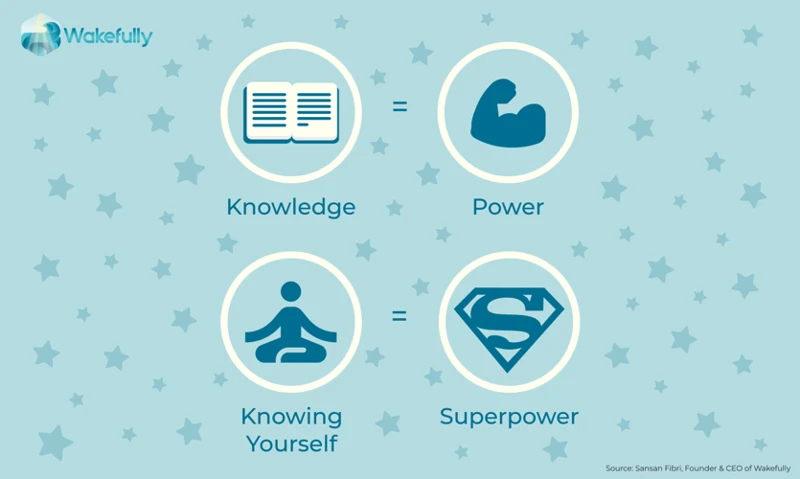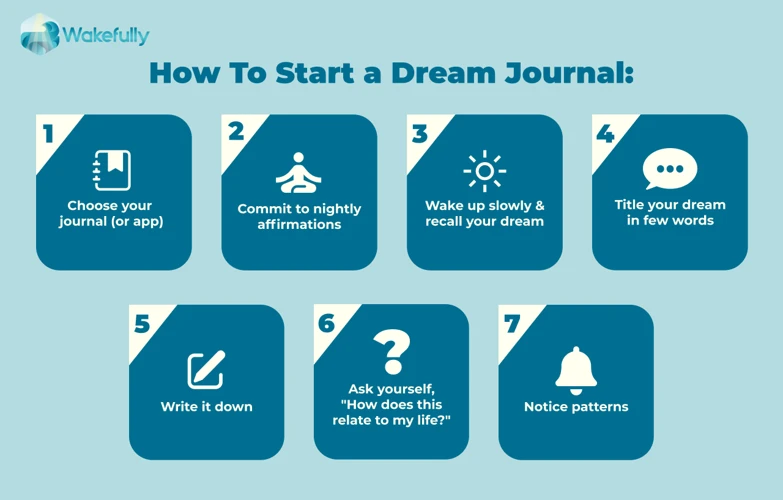It’s common knowledge that our dreams are mysterious and fascinating, but have you ever considered the role they play in self-discovery? It’s easy to dismiss our dreams as mere fantasies, but the truth is, they provide us with valuable insights into our inner selves. By keeping a dream journal and analyzing our dreams, we can unlock a deeper understanding of our emotions, behaviors, and beliefs. This process of self-discovery can be difficult to navigate, but with the help of some techniques and tips, we can incorporate dream journaling into our self-discovery practice and experience profound personal growth. If you’re ready to unlock the power of your dreams, continue reading to learn more about the connection between dream journaling and self-discovery.
Contents
- Dreams and Self-Discovery
- The Power of Dream Journaling
- Techniques to Interpret Your Dreams
- Applying Dream Insights to Self-Discovery
- Incorporating Dream Journaling into Your Self-Discovery Practice
- Tips for Overcoming Dream Journaling Challenges
- Conclusion
-
Frequently Asked Questions
- What is dream journaling?
- Why is dream journaling important for self-discovery?
- What are some common dream symbols and their meanings?
- How can I remember my dreams better?
- What if I have trouble interpreting my dreams?
- Can lucid dreaming be a form of self-discovery?
- What are some challenges I may encounter when dream journaling?
- Do I need to analyze every dream I have?
- Can dream journaling be used for therapeutic purposes?
- Is there a right or wrong way to keep a dream journal?
- References
Dreams and Self-Discovery

Have you ever woken up from a dream feeling like you’ve uncovered a hidden part of yourself? Dreams have long been a subject of fascination and mystery, with many people experiencing profound and sometimes unsettling experiences while they sleep. However, these experiences can also hold a key to self-discovery and personal growth. By exploring the connection between our dreams and our inner selves, we can gain valuable insights about our thoughts, emotions, and behaviors. In the following sections, we’ll delve deeper into the significance of dreams for self-discovery and reveal how dream journaling can unlock their full potential.
How Dreams Reveal Our Inner Selves
Dreams reveal aspects of our inner selves that sometimes remain hidden in our waking lives. Through dreams, we have access to our subconscious mind and can better understand our deepest desires, fears, and motivations.
|How do dreams reveal our inner selves?|
|Symbols and metaphors|
Our dreams are full of symbols and metaphors that represent aspects of our inner selves. For example, dreaming of a snake may represent fear or transformation, while dreaming of a butterfly may symbolize growth and change. These symbols can provide insight into our inner state and guide us towards self-discovery.
|Unconscious thoughts and emotions|
Dreams offer a window into our unconscious thoughts and emotions. In dreams, we may confront feelings or experiences that we have repressed in waking life. These experiences can range from childhood memories to current stressors. By confronting these experiences, we can better understand our emotions and begin to work through any issues that may be holding us back.
|Recurring themes and patterns|
Recurring themes and patterns in our dreams can also reveal aspects of our inner selves. For example, if we dream repeatedly about being chased, this may indicate a fear of failure or avoidance of confrontation. By recognizing and exploring these patterns, we can gain insight into our inner psyche and work towards personal growth.
Dreams provide a unique opportunity for self-discovery by offering access to our subconscious mind. Through symbols, emotions, and patterns, we can gain insight into our inner selves and use this information to work towards personal growth and empowerment.
The Benefits of Self-Discovery Through Dreams
Exploring our dreams can uncover unexplored aspects of ourselves and offer unique insights into our lives. Here are some of the key benefits of delving into our dreams to promote self-discovery:
| Increased Self-Awareness: | As we reflect on our dreams and uncover patterns, symbols, and metaphors, we become more conscious of our emotions, thoughts, and behaviors. This newfound self-awareness can help us make meaningful changes in our lives. |
| Access to the Unconscious Mind: | Dreams offer a window into our unconscious mind, providing insight into our deepest thoughts, feelings, and desires. Exploring our dreams can help us understand aspects of ourselves that have been buried or repressed. |
| Opportunities for Problem-Solving: | Our dreams often reflect our current challenges and concerns, providing a safe space to explore potential solutions. By tapping into our dreams’ wisdom, we can gain fresh perspectives and creative ideas for problem-solving. |
| Enhanced Creativity: | By exploring our dreams, we engage with symbolic and metaphorical content that can stimulate our imagination and inspire creativity. Our dreamwork can boost our artistic endeavors, writing, and other creative pursuits. |
| Self-Reflection and Healing: | Through dream journaling and interpretation, we can identify and work through areas of emotional pain and trauma. Our dreams can provide a safe space to reflect on our experiences and emotions, ultimately leading to healing and personal growth. |
These benefits underscore the value of incorporating dream exploration into our self-discovery practice. By paying attention to our dreams and reflecting on their deeper meaning, we can unlock our potential for personal growth and transformation.
The Power of Dream Journaling

When we close our eyes at night, we enter into a mysterious world of our dreams. Our dreams can be powerful sources of insight and self-discovery, but they can also be difficult to remember and interpret. Luckily, there is a powerful tool that can help us unlock the hidden meanings of our dreams: dream journaling. By keeping a journal of our dreams, we can start to see patterns, symbols, and emotions that reveal our deepest inner selves. In this section, we will explore the power of dream journaling and how it can help us on the path of self-discovery.
Why Keep a Dream Journal?
One of the main reasons for keeping a dream journal is to gain insights into our subconscious minds. Dream journaling is an effective tool for exploring the hidden aspects of our psyche, discovering patterns in our dreams, and gaining a deeper understanding of ourselves. Here are some specific reasons why keeping a dream journal is beneficial:
| Reasons to Keep a Dream Journal | Benefits |
|---|---|
| To Enhance Dream Recall | Writing down our dreams regularly trains our brain to remember more details, making it easier for us to recall dreams in the future. |
| To Identify Patterns | By recording our dreams over time, we may start to notice recurring elements or themes, which can reveal underlying emotions, fears or desires we may not be fully aware of. |
| To Process Emotions | Writing about our dreams can help us process intense emotions and feelings that we may not be able to express in waking life. Reflecting on our dreams may give us the opportunity to confront uncomfortable emotions and work through them on a deeper level. |
| To Work on Personal Growth | Dreams often present us with situations and scenarios that challenge us in some way, and by recording and analyzing our dreams, we can work on improving aspects of ourselves or our lives. |
| To Connect to Our Inner Wisdom | By regularly reflecting on our dreams, we can tap into our subconscious minds and uncover insights and intuition that we may not be able to access in our waking lives. |
Keeping a dream journal can help us enhance our dream recall, identify patterns, process emotions, work on personal growth, and connect to our inner wisdom. It is an excellent tool for self-discovery and can lead to a deeper understanding of ourselves and our place in the world.
How to Keep a Dream Journal
To keep a dream journal, follow these simple steps:
- Keep your journal right by your bed: Make sure your dream journal is easily accessible and within arm’s reach, so you can quickly jot down your dreams as soon as you wake up. This will ensure that you capture all the details while they’re still fresh in your mind.
- Write down every detail: Record everything you remember, no matter how small or insignificant it might seem. This includes people, objects, colors, sounds, and emotions. These details might reveal patterns or insights that you might miss otherwise.
- Note the date and time: Make a note of the date and time of your dream. This can help you identify any recurring themes, symbols, or patterns in your dreams that you might miss otherwise.
- Organize your entries: Some people prefer to organize their dream journal entries by themes, while others like to keep a chronological log of their dreams. Choose a method that works best for you and stick with it.
- Include sketches or drawings: If possible and you are skillful, use sketches or drawings. Images can often capture a dream’s essence and details better than words, especially for people who are visual learners.
- Review and reflect: Regularly reread and reflect on your dream journal entries. Notice any patterns, symbols, or emotions that emerge. Explore the themes and messages that might be relevant to your waking life experience.
By following these simple steps, you can build a comprehensive dream journal that will help you understand your subconscious mind better, and increase your opportunities for self-discovery.
Techniques to Interpret Your Dreams

Dreams are mysterious, often unpredictable messages from our subconscious that can be difficult to interpret. However, unlocking the meaning behind our dreams can offer valuable insights into our inner selves and guide us on the path to self-discovery. To help decode the cryptic symbols and messages in our dreams, there are several techniques available for interpretation. By exploring techniques such as recognizing patterns and symbols, working with emotions, and using active imagination, we can learn to better understand ourselves and our place in the world.
Recognizing Patterns and Symbols
When it comes to interpreting your dreams through journaling, recognizing patterns and symbols can play a crucial role in uncovering the underlying messages. Here are some steps you can take to better recognize these patterns and symbols:
- Stay observant. The first step in recognizing patterns and symbols is to stay aware and observant while you’re dreaming. Make a conscious effort to remember the details of your dreams, including any recurring themes or symbols.
- Keep a dream dictionary on hand. A dream dictionary can be a helpful tool in understanding the meanings behind certain symbols. For example, dreaming about water often represents emotions or the unconscious mind.
- Consider personal associations. While a dream dictionary can be useful, it’s important to remember that symbols can have different meanings for different people. Consider your personal associations with certain symbols and what they might mean for you.
- Look for connections. Pay attention to how different symbols and patterns interact with each other within your dreams. Are there any recurring combinations or themes? This can give insight into the underlying message of your dreams.
- Reflect on your waking life. Another helpful way to identify patterns and symbols is to reflect on your waking life. Are there any situations or emotions that may be manifesting in your dreams? This can help you connect the dots and understand the deeper meaning behind your dream imagery.
Recognizing patterns and symbols in your dreams takes practice and patience. However, with time and attention, you can develop a greater understanding of your inner self and the messages your dreams may be trying to communicate to you.
Working with Emotions in Dreams
When it comes to interpreting your dreams for self-discovery, working with the emotions you experienced in the dream can be incredibly insightful. Dreams have a way of bringing up deep-seated emotions that we may not even realize we are carrying with us in our waking lives. Here are some techniques for working with emotions in dreams:
| Technique | Explanation |
|---|---|
| Journaling | Write down the emotions you experienced in your dream as well as any other details you can remember. Then, reflect on what those emotions might represent in your waking life. Are you feeling anxious or stressed about something? Did the dream bring up feelings of joy or excitement? |
| Visualization | Close your eyes and try to recreate the emotions you felt in your dream. Then, envision yourself in a peaceful or calming environment, perhaps in nature or with loved ones. This can help you work through any negative emotions and find a sense of peace. |
| Situational Analysis | Think about the events and characters in your dream and try to relate them to situations in your waking life. What about those situations might be causing you to feel certain emotions? Are there people or circumstances in your life that you need to address in order to feel more emotionally balanced? |
By working with your emotions in dreams, you can gain a deeper understanding of your inner self and identify any emotions that may be hindering your personal growth. This can lead to greater self-awareness and emotional intelligence in your waking life.
Using Active Imagination
Active imagination is a powerful tool for interpreting and exploring the deeper meanings of our dreams. This technique involves immersing oneself in the experience of the dream and engaging with its images and symbols on a deeper level. Here are some steps to help you use active imagination in your dream journaling practice:
- Find a quiet space. Set aside some time and space where you can be alone and uninterrupted.
- Close your eyes. Take a few deep breaths and allow yourself to relax and become present in the moment.
- Visualize the dream. Picture the dream in your mind as vividly as possible. Try to imagine the colors, textures, and sounds that were present.
- Engage with the dream. Allow yourself to enter into the dream as if you are there. Look around, touch things, and interact with the dream characters and objects.
- Ask questions. While you are in the dream, ask questions of the characters and symbols you encounter. You can ask for clarification, guidance, or insight into what they represent.
- Listen for answers. As you ask questions, be open to receiving answers. These may come in the form of words, images, or feelings.
- Reflect on your experience. Once you feel you have engaged fully with the dream, take some time to reflect on what you have learned. Note any insights or new understandings that have emerged.
Using active imagination can be a powerful way to deepen your connection with your dreams and gain a greater understanding of their significance in your life. By engaging with your dreams in this way, you are opening yourself up to new insights and experiences that can help you on your journey of self-discovery.
Applying Dream Insights to Self-Discovery

Dreams have long fascinated and intrigued humans, offering a glimpse into our subconscious minds and revealing deep-seated emotions and desires. As we explored earlier in this article, dream journaling can be a powerful tool for self-discovery as it allows us to uncover patterns and gain insights into our inner selves. Now, let’s delve deeper into how we can take those insights and apply them to our personal growth journey. By using dream insights for self-discovery, we can gain a better understanding of ourselves and work towards becoming the best version of ourselves.
Identifying Personal Triggers and Blind Spots
When we delve deeper into our dreams and begin to connect them with our waking lives, we may start to notice recurring themes, symbols or motifs that appear frequently throughout our dreams. These can be personal “triggers” that point to areas of our lives that we may need to explore further in order to understand our underlying emotions, motivations and behaviors. In this way, our dreams can serve as a powerful tool for identifying our personal triggers and blind spots.
Triggers: Triggers are events, situations, or even people that evoke an emotional response or reaction in us. These can be both positive and negative. Triggers can manifest in our dreams as recurring symbols or themes that evoke a strong emotional reaction. For example, if you frequently dream about being pursued by a menacing figure, this could be a trigger for feelings of anxiety or fear.
Blind Spots: Blind spots are aspects of ourselves that we may not be aware of, or that we actively try to ignore or suppress. These can be related to our thoughts, feelings, beliefs, or behaviors. Blind spots can manifest in our dreams as recurring symbols or themes that we may not fully understand or recognize. For example, if you frequently dream about being lost or unable to find your way, this could be a blind spot related to feeling directionless or uncertain in your waking life.
By paying close attention to these triggers and blind spots in our dreams, we can gain valuable insights into our subconscious minds and begin to unravel the underlying patterns and beliefs that guide our thoughts and actions. This can lead to greater self-awareness and personal growth as we work to address these areas of our lives.
| Triggers: | Blind Spots: |
|---|---|
| Events, situations, or people that evoke an emotional response or reaction in us. | Aspects of ourselves that we may not be aware of, or that we actively try to ignore or suppress. |
| Manifest in our dreams as recurring symbols or themes that evoke a strong emotional reaction. | Manifest in our dreams as recurring symbols or themes that we may not fully understand or recognize. |
| Examples: being chased, falling, losing something important. | Examples: feeling lost or directionless, encountering unfamiliar or confusing situations. |
Empowering Self-Growth Through Dream Reflection
Empowering Self-Growth Through Dream Reflection can be an incredibly transformative practice. As we delve deep into our subconscious through our dreams, we may uncover hidden fears, desires, and beliefs that we weren’t even aware of. By reflecting on and analyzing our dreams, we can gain valuable insights into ourselves and use this newfound knowledge to drive our personal growth.
| Step | Action |
|---|---|
| 1 | Re-read your dream journal entries and identify recurring themes, symbols, and emotions. |
| 2 | Reflect on what these recurring elements could represent in your waking life. For example, if you often dream about being chased, it could be a sign that you’re avoiding confronting a problem in your waking life. |
| 3 | Try to connect the themes and symbols in your dreams to your past experiences, relationships, and beliefs. For instance, if you frequently dream about water, it could be connected to a childhood memory of swimming with a family member. |
| 4 | Write down your insights and observations in your dream journal and brainstorm actionable steps you can take to address any issues that come up. |
| 5 | Take time to meditate or visualize yourself acting on these insights, to help make them more real and actionable. This can empower you to take steps toward personal growth and positive change. |
Dream reflection can be uncomfortable at times, as it requires us to confront aspects of ourselves that we may have been ignoring or denying. However, by embracing the challenge, we can unlock immense potential for self-growth and self-discovery.
Incorporating Dream Journaling into Your Self-Discovery Practice

Dream journaling can be a powerful tool to incorporate into any self-discovery practice. It can offer unique insights into our subconscious minds and help us identify patterns and beliefs that may be holding us back. Here are some tips for incorporating dream journaling into your self-discovery practice:
1. Make it a habit: Consistency is key when it comes to dream journaling. Set aside a few minutes each morning to record your dreams before they slip away from memory.
2. Review and reflect: Take time to review your dream journal entries at the end of each week or month. Look for recurring themes or symbolism that may offer clues to your inner thoughts and emotions.
3. Use prompts: If you’re struggling to remember or interpret your dreams, try using prompts to guide your writing. For example, you could ask yourself “What emotions did I experience in this dream?” or “What conflicts or challenges did I encounter?”.
4. Practice active imagination: If you’re stuck on a particular dream or symbol, try practicing active imagination by writing out a dialogue between yourself and the dream. This can help you gain a deeper understanding of the message your subconscious is trying to convey.
5. Be open-minded: Remember that dream symbolism is highly personal and can vary significantly from person to person. Be open to exploring different interpretations and don’t be afraid to explore uncomfortable or challenging themes that may arise.
By incorporating dream journaling into your self-discovery practice, you may gain valuable insights into your inner self that you may not have otherwise uncovered. Remember to be patient and consistent in your practice, and don’t be afraid to seek out additional resources or support if you need it.
Tips for Overcoming Dream Journaling Challenges
Embarking on a dream journaling practice can be a rewarding way to explore your inner self, but as with any new habit, there can be challenges along the way. Here are some tips for overcoming common dream journaling challenges:
Lack of Motivation: Keeping up with a dream journaling practice can be difficult when you’re not feeling motivated. To overcome this challenge, try setting small goals for yourself, such as writing down one dream per week, and gradually increase the frequency as you become more comfortable with the practice. Additionally, remind yourself of the benefits of maintaining a dream journal, such as gaining insight into your inner world and promoting personal growth.
Forgetting Dreams:It can be frustrating to wake up with a sense that you had a vivid dream, only to have it slip away from memory moments later. To combat forgetfulness, keep a notebook and pen by your bedside and try to record any details that you can remember as soon as you wake up, even if it’s just a single image or feeling.
Difficulty Interpreting Dreams:Interpreting dreams can be a challenge, especially if you’re struggling to make sense of the symbols or actions that occur. One way to overcome this challenge is to ask a friend or therapist for their interpretation or to do some research on common dream symbols. Remember that the most important interpretation of a dream comes from your own inner wisdom, so take some time to reflect on what your dream might be trying to tell you.
Emotional Discomfort:Sometimes, writing about our dreams can bring up uncomfortable emotions or feelings. If this happens, take a break from your dream journaling practice for a few days or consider working with a therapist to process and work through any emotions that arise.
Time Management:Keeping a dream journal can be time-consuming, especially if you’re struggling to remember multiple dreams each night. To manage your time more effectively, consider setting aside a specific time each day to write in your journal and prioritize recording the most significant or memorable dreams.
By utilizing these tips, you can overcome the challenges of dream journaling and reap the benefits of this powerful self-discovery tool. Remember that maintaining a dream journal is a personal journey, so don’t hesitate to adjust your practice to suit your unique needs and goals.
Conclusion
In conclusion, dream journaling can be a powerful tool for self-discovery. By recording and interpreting our dreams, we have the opportunity to delve into our subconscious minds and gain insights into ourselves that may have been previously hidden.
Through dream journaling, we can recognize patterns and symbols that reveal our inner thoughts and emotions. We can use our dreams to identify personal triggers and blind spots, and empower ourselves to work on areas of self-growth.
Keeping a dream journal can also pose challenges, such as difficulty remembering dreams or feeling unsure of how to interpret them. However, with patience and practice, we can learn to overcome these obstacles and reap the benefits that dream journaling has to offer.
Overall, incorporating dream journaling into our self-discovery practice can lead to a deeper understanding of ourselves and ultimately, a more fulfilling life. So why not give it a try and see where your dreams can take you?
Frequently Asked Questions
What is dream journaling?
Dream journaling is the practice of keeping a record of your dreams in a journal or notebook.
Why is dream journaling important for self-discovery?
Dream journaling helps us tap into our unconscious mind and reveal aspects of ourselves we may not be aware of in our waking life. This can lead to personal growth and self-discovery.
What are some common dream symbols and their meanings?
Common dream symbols include flying (freedom), water (emotion), and teeth falling out (anxiety or fear of loss).
How can I remember my dreams better?
You can improve dream recall by setting an intention to remember your dreams, keeping a dream journal by your bed, and reviewing your dreams as soon as you wake up.
What if I have trouble interpreting my dreams?
If you’re having trouble interpreting your dreams, try discussing them with a therapist or dream coach who can help you identify patterns and symbols.
Can lucid dreaming be a form of self-discovery?
Yes, lucid dreaming can be a powerful tool for self-discovery as it allows us to explore our subconscious mind and gain insights about ourselves.
What are some challenges I may encounter when dream journaling?
Challenges when dream journaling can include forgetting to record dreams, feeling like you don’t have time, or struggling to interpret your dreams.
Do I need to analyze every dream I have?
No, not every dream may have significant meaning or symbolism. It’s up to you to decide which dreams to analyze and reflect on.
Can dream journaling be used for therapeutic purposes?
Yes, dream journaling is often used in therapy as a way to access and process unconscious material, and can promote personal growth and self-awareness.
Is there a right or wrong way to keep a dream journal?
No, there is no right or wrong way to keep a dream journal. It’s a personal practice, so do what works best for you and your lifestyle.







